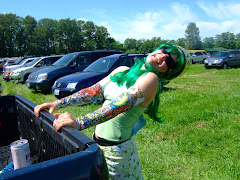I have always been intrigued by mysteries, and especially real-life stories of disappearances and murders. It isn't the grisliness that appeals to me, it's the psychology behind the stories that I am gripped by--the why rather than the what or the how.  For that reason, I'm pretty finicky about the "true crime" that I read--see the sidebar for a list of my all-time favorites--they have to have some unique quality or focus that distinguishes them from the dozens of grocery-store paperbacks that appear on the shelves. They have to reveal something new about behavior and life, something that helps.
For that reason, I'm pretty finicky about the "true crime" that I read--see the sidebar for a list of my all-time favorites--they have to have some unique quality or focus that distinguishes them from the dozens of grocery-store paperbacks that appear on the shelves. They have to reveal something new about behavior and life, something that helps.
Kathryn Harrison's book While They Slept: An Inquiry into the Murder of a Family, fit my criteria. Ostensibly about Billy Gilley's 1984 murder of his parents and sister in Medford, Oregon, it's really about the psychology of family; the impact of violence, and the possibility and process of healing in the aftermath of horror. Because Gilley spared his older sister, Jody, Harrison has access to the only person besides the murderer who can offer insight into the crimes, and much of the research she did for While They Slept involved meeting with Jody again and again to find out what happened in her family prior to its destruction and how, in the twenty years since, she has created a successful, happy life despite her shocking history.
Harrison carefully examines the pathology of the Gilley family, exposing the Gilleys as abusive parents who failed to nurture their son; the child protection services that failed to investigate claims of abuse in the home, and the mentality of the man whose rage and warped sense of justice made him a killer. She juxtaposes Billy Gilley's psyche with that of the sister he spared--a woman who, growing up, retreated from the violence and mistreatment in the home by surrounding herself with books, and one who ultimately has repaired the damage that was done before and after her parents were killed.
Harrison is a gifted writer, able to pull together the many complex elements of this story and the lives of each member of the Gilley family to create an account that is certain to be compared to In Cold Blood for both its literary quality and its insightful and unique approach to the analysis of tragedy.

No comments:
Post a Comment